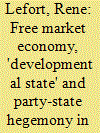|
|
|
Sort Order |
|
|
|
Items / Page
|
|
|
|
|
|
|
| Srl | Item |
| 1 |
ID:
032035


|
|
|
|
|
| Publication |
London, Zed Press, 1981.
|
| Description |
xiii, 301p.pbk
|
| Standard Number |
0862321549
|
|
|
|
|
|
|
|
|
|
|
|
Copies: C:1/I:0,R:0,Q:0
Circulation
| Accession# | Call# | Current Location | Status | Policy | Location |
| 025357 | 963.06/LEF 025357 | Main | On Shelf | General | |
|
|
|
|
| 2 |
ID:
120912


|
|
|
|
|
| Publication |
2012.
|
| Summary/Abstract |
Ethiopia's development strategy rests on the promotion of a market economy, driven by 'new entrepreneurs', both urban and rural, while, to bring it to 'maturity' and to compensate for its present 'failures', the resolute intervention of a 'developmental state' is essential. Simultaneously, the ruling party aims to sustain its political hegemony by enrolling massively among those at the top of the social pyramid, to which most of these 'new entrepreneurs' belong, so as to build its new constituency on them. In the rural areas (83% of the population), the merger of these two objectives leads to the mobilisation of the upper group of smallholder farmers, recruited both as 'model farmers' to become the engine for the growth, notably with the support of a massive public Agricultural Extension Programme, and also as members of the ruling party. However, the subordination of the regime's economic objectives to its political agenda undermines the implementation of its development strategy at the field level. This raises questions about the efficiency of the programme and the room left for entrepreneurship, even though this is a mainstay of the market economy that the regime sees as 'vital' for Ethiopia's 'survival' (Meles 2006).
|
|
|
|
|
|
|
|
|
|
|
|
|
|
|
|
| 3 |
ID:
099369


|
|
|
|
|
| Publication |
2010.
|
| Summary/Abstract |
Most of the reports about the reaction of the Ethiopian regime to the blow that it suffered in the 2005 elections focus on its institutional evolution, and conclude that it took a turn towards even stronger authoritarianism. Observations made in a rural community in south-east Amhara State reveal that it reacted first, until the end of 2009, by a whole range of the deepest reforms since its takeover in 1991. These combined a stronger grip of the ruling party in all areas with a 'liberalisation' of the rural development strategy and first steps towards local 'good governance'. They were embodied in the rise of the traditional rural elite which had been ostracised for years, as if the regime was trying to build its new constituency on it. But at the end of 2009 the local authorities suddenly returned to the all-encompassing authoritarian attitude characteristic of the pre-2005 period. This 'liberalisation' could thus be seen as merely a tactical interlude, conceded by a ruling party still driven by its Leninist legacy and the Abyssinian 'culture of power'.
|
|
|
|
|
|
|
|
|
|
|
|
|
|
|
|
|
|
|
|
|